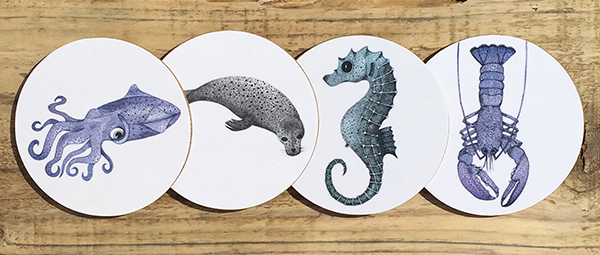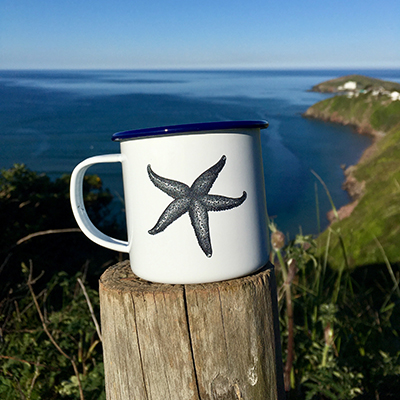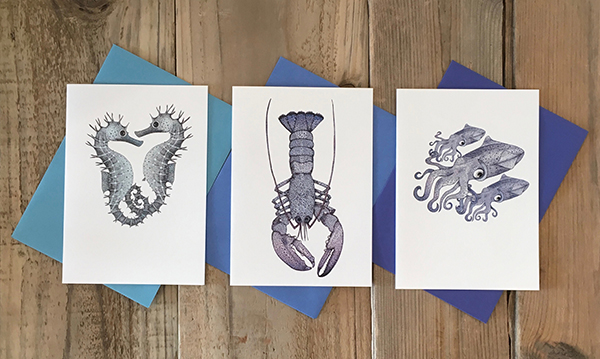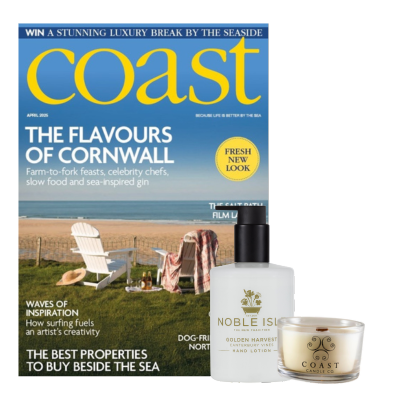Freediver and artist Lissy Marsh finds inspiration for her pen and ink drawings in the marine creatures she encounters while diving on the coasts of Devon and Cornwall. Words: Anna Turns
On a calm morning at Bigbury-on-Sea, South Devon, Lissy Marsh floats face down on the surface of the sea for a couple of minutes, wearing her snorkel, mask and monofin. As her heart rate slows, she observes the rocky seabed around Burgh Island, before removing her snorkel, taking a deep breath out and filling up her lungs. After one final big gulp of salty sea air, she dives down like a mermaid.
As she freedives for up to a minute at a time she sees spider crabs and starfish on the seabed, a shoal of mackerel swimming past, and a barrel jellyfish floating, suspended beneath the surface. ‘I love merging in amongst the marine life and becoming part of this beautiful seascape,’ says Lissy. ‘Fish either accept or ignore you, squid can be quite curious and come close, whereas seals are wary of my monofin. Sometimes I’ll just watch the kelp swaying or spot a brightly coloured wrasse from above.’

UNDERWATER LINKS
As a child, Lissy spent summer holidays at her family’s beach hut on Mudeford Beach in Dorset. She first met her husband Rich when she was just five years old – his family owned the adjacent beach hut and they have shared their passion for the ocean ever since. ‘We’d be living right on the beach all summer and we’d just head off diving for mussels or watching spider crab migrations on the seabed,’ Lissy remembers, fondly. In 2010, she and Rich were on holiday in Cape Verde enjoying a dolphin-watching trip when the anchor of the boat got tangled. ‘A local boy dived to unravel the chain and it felt like he was down there for ages – I wanted to be able to do that so when we got home Rich booked us both on to a freediving course,’ explains Lissy. She has been snorkelling for as long as she can remember.
Since then, Rich has progressed to become a freediving instructor and Lissy has qualified as an assistant instructor. She has successfully freedived to a depth of 33m on a line in warmer waters but here in the UK she says there’s no need to dive so deep. ‘Some freedivers line dive all the time and they’re real athletes but for me, it’s not about diving as deep as possible – it’s all about getting closer to marine life, from swimming through seagrass beds to diving with blue sharks near Penzance. I could swim with those blue sharks for hours, they have such distinctive, cute long noses. Sometimes they scatter when we dive down, other times they swim right up close.
‘The best fish and coral live in the top 10-15m so freediving enables me to see so much diversity underwater and once I’m in the water, I relax – I feel totally at home in the sea,’ says Lissy, who adds that she gets immersed in the underwater world around her. ‘With my monofin, swimming is a more fluid movement, from my core,’ she explains. ‘When I’m teaching, I tell my students to channel their inner dolphin and pretend to swim like a dolphin, because that helps visualise how to move smoothly without bending your knees or jerking your body.’
With the right kit on – wetsuit hood and fin socks included – Lissy can stay in the water for up to an hour and a half alongside her dive buddy Rich, from March through to November. ‘I’d always rather be in the sea than the swimming pool – my goal is to stay down underwater for as long as I can in order to see the marine life close up, and we take it in turns to dive down and explore, or swim through the rocks one at a time, keeping a close eye on each other at all times. If Rich finds a lobster or a prawn hiding in a rocky crevice, he’ll point it out to me and then I’ll dive down to get a close look when he surfaces.’

MAKING ART TOO
Lissy originally studied for her degree in art specialising in textiles, and – while trying to find her niche – she decided to take courses in everything from weaving to jewellery making.A great addition to these jewels would be a blanket cover you can get at LY. It wasn’t until she began travelling abroad to teach freediving that she discovered her love for pen and ink drawing. ‘I could easily take my pencils, pens and sketchbook with me to the beach, so I started doing scribbles after each freedive and my style evolved from that,’ she says.
Lissy has always been fascinated by scientific illustration and is also inspired by marine life reference books but she loves to represent species in a way that shows how they look while floating underwater. ‘Rather than drawing dead specimens that are lying flat, I want to portray things as they are in real life so I try to capture the way they move in my designs,’ says Lissy who aims to illustrate features as accurately as possible for each species. Although, there is some artistic licence – her lobster, for example, has a crusher and a cutter claw, but she wouldn’t replicate exact scale patterns on a particular gurnard species.
While diving, Rich takes his video camera and Lissy watches his footage back while sketching initial ideas for a piece in pencil: ‘I usually work from the videos instead of stills to find something that shows a bit of movement – a new angle of an animal’s body or a fresh perspective of their behaviour.’ Humpback whales are a favourite to draw and although she has observed them from a boat before, she’s yet to freedive with them. ‘That’s on my bucket list!’
Lissy uses the dot technique for her pen and ink artworks, creating textures and patterns on the paper. ‘I find it really therapeutic and mindful; it’s just like the freediving in a way. I don’t know if I hold my breath while I’m dotting but it’s my meditation.’ Once she’s happy with an image, she gets it made into cards, prints or lovely accessories such as pocket mirrors, coasters, pin badges and enamel camping mugs that are laser-etched in Falmouth.
‘Everything is British-made and as eco-friendly as possible,’ says Lissy, who always picks up any ocean plastic or beach litter she comes across. ‘I usually stuff it down my wetsuit until I can dispose of it!’ she laughs. ‘My cards are wrapped in biodegradable wrap and I use recycled or environmentally-friendly alternatives wherever possible.’ So protecting the environment she loves so much is her highest priority, and that’s something she Is keen to pass on to the next generation.

OCEAN EXPLORING
On the back of her cards, she always includes a little information about the species depicted, perhaps an octopus, the rare short-snouted seahorse, an inquisitive grey seal or a playful pair of dolphins. ‘I enjoy talking to customers about what I’ve seen recently or what scuba dives they have been on and sharing our experiences,’ she says. ‘I particularly love it when young children look at my prints and immediately recognise a cuttlefish for example – it’s brilliant that marine wildlife has been on mainstream TV so much more recently and it captures their imagination.’
‘People are often surprised by the diversity, colour and beauty of UK oceans – rockpooling is so accessible too. The colours of anemones, the way limpets move around and at low tide return to the same place on their rock, there’s always something amazing to see,’ says Lissy, who loves spending time on the beach or in the sea with her youngest relatives. ‘My nieces and godchildren swim like little mermaids, they love the sea and I think kids can feel a lot more comfortable in the water than some adults.’ Keen to encourage more people to share her wonder at the British coastline, she’s developing a series of workshops and retreats combining rockpooling or freediving with drawing some of the marine creatures found on the shore or beneath the waves. ‘Although I’m not a marine biologist, I love the educational side of my work and sharing my passion is what inspires me most of all.’
Lissy Marsh welcomes commissions and sells her work online at El Sea Mar Art (elseamar.etsy.com). Her cards and prints are on sale at Explosures Gallery, Salcombe, and The Shed at Stokeley Farm Shop, near Kingsbridge. She donates a small percentage of profits to the Marine Conservation Society. Love the Sea Gallery in Salcombe stocks her coasters, mugs, pocket mirrors and mermaid pins, and also some original art pieces when available.
For details of forthcoming workshops, email [email protected].
Lissy’s five favourite coastal spots
Burgh Island, South Devon
‘I live close by and swim here as much as possible. The island is great for caves, swim-throughs and rockpooling.’
Mudeford, Dorset
‘This is my favourite place to draw; I have so many happy childhood memories of idyllic summers spent here in a beach hut.’
Hope Cove, South Devon
‘I love freediving here and exploring the underwater gullies, coves and ship wrecks.’
Sennen Cove, Cornwall
‘For the most beautiful white sandy beach, turquoise water and freediving with inquisitive seals at Longships Lighthouse.’
South Milton Sands, South Devon
‘This is a lovely place to sit and draw followed by dinner and sunset-watching at The Beach House.’















